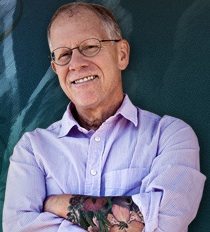 While California wines were losing my attention, Steve Heimoff grabbed it. That may sound like an oddity since Steve is known for his sustained and successful career as California Editor at the Wine Enthusiast and, before that, the Wine Spectator. Actually, it wasn’t strange in my world; I study journalists with a knack for integrating new digital media strategies alongside their hardened routines with the level of intense scrutiny you might give to fantasy sports team picks (I would have drafted Steve Long ago). Surprisingly to me, Steve didn’t, nor does he now, not even in the least bit, think about grand strategy. He is driven to write by visceral experience and emotional reward, a refreshing and wholly palatable outlook on regular digital media content creation. This week I was fortunate to have spent three hours in Oakland with Steve, over a latte I wish hadn’t ended, to better understand what makes him tick.
While California wines were losing my attention, Steve Heimoff grabbed it. That may sound like an oddity since Steve is known for his sustained and successful career as California Editor at the Wine Enthusiast and, before that, the Wine Spectator. Actually, it wasn’t strange in my world; I study journalists with a knack for integrating new digital media strategies alongside their hardened routines with the level of intense scrutiny you might give to fantasy sports team picks (I would have drafted Steve Long ago). Surprisingly to me, Steve didn’t, nor does he now, not even in the least bit, think about grand strategy. He is driven to write by visceral experience and emotional reward, a refreshing and wholly palatable outlook on regular digital media content creation. This week I was fortunate to have spent three hours in Oakland with Steve, over a latte I wish hadn’t ended, to better understand what makes him tick.
Steve was furiously posting 5x a week at SteveHeimoff.com (admittedly only missing three daily deadlines since 2008, two from hangovers) for an entire year by the time I launched WineZag in May of 2009. It is one of the few blogs I try to read every day. He has something relevant to offer in as authentic and consistent a voice as any. It has become a key read and go-to destination for the California wine trade to tee up their points of view in response to Steve’s volleys. I asked him how many posts he’s published and he told me to do the math; the fact is he does not keep track. Audience size and numbers do not drive Steve. He writes because for him “it’s like sex.” Enough said?
With one of the most popular blogs in the entire wine blogosphere, Steve only has the vaguest idea of who his readers are, where they come from, what his most popular search terms are, or how many real subscribers he has. He’s not even certain what an RSS feed is. I don’t mention any of this to malign him, nor to point out any inadequacies. It’s just contextually interesting how focused so many wine bloggers are on facilitating measurable outcomes from their blogging, and how little Steve cares about anything other than engagement around two things he is most passionate about; wine and journalism. Steve curiously and good spiritedly chided a very high profile blogger, who I won’t mention here, that told him his ultimate goal was to build an asset so Rupert Murdoch could buy it for $1M. The curious part, for Steve, was that it is something he never thought about, could not fathom, nor understood anything about the aspects nor prospects of structuring such a deal.
A couple weeks ago I published a round-up post on Tom Wark’s, Steve Heimoff’s, and Alder Yarrow’s recent thoughts on the wine blogosphere called Wine Blog Confessions. Tom left a comment underscoring the vast variety of reasons people start their blogs, and that when he started Fermentation he “simply wanted a venue to express ideas and thoughts about my industry and try to start conversations. This turned out to be good for my business as a wine publicist and marketer. Interestingly, I had no idea that would be one of the outcomes of me mouthing off in a blog. Who knew?”
Fascinatingly, Steve struggles to talk demonstratively about the benefits SteveHeimoff.com offers his personal brand or other aspects of his career. His brain just isn’t wired that way, so I will speak for him. His value to the Wine Enthusiast has increased exponentially from his blogging. I am not sure if Adam Strum gets it or not, but as a magazine Publisher myself, I would want the post blogging-era Steve on my masthead over the pre-blog Heimoff. It will sell more copies and advertising while raising the value of my media property. On a personal note, I never paid attention to Steve before I found his blog. Now, I read the Wine Enthusiast to understand more about his perspectives and dual approach to covering California wine and its community.
 Having watched Steve work the rigors of daily blogging alongside a non-trivial traditional journalism job for the last three years, I just assumed he figured out ways to save time and create efficiencies between the blog and magazine content creation. No such thing. Steve does not plan his blog topics in advance the way structured calendars are organized at the Wine Enthusiast. Surrendering all research and planning advantages that other working journalists will leverage across multiple related assignments, Steve just hopes he is “lucky and the gods deliver the topic the day before. Otherwise I have until 8am, filled with the anxiety associated with the need to push the publish button.”
Having watched Steve work the rigors of daily blogging alongside a non-trivial traditional journalism job for the last three years, I just assumed he figured out ways to save time and create efficiencies between the blog and magazine content creation. No such thing. Steve does not plan his blog topics in advance the way structured calendars are organized at the Wine Enthusiast. Surrendering all research and planning advantages that other working journalists will leverage across multiple related assignments, Steve just hopes he is “lucky and the gods deliver the topic the day before. Otherwise I have until 8am, filled with the anxiety associated with the need to push the publish button.”
So why does somebody like Steve Heimoff, cemented as a welcomed and authoritative wine critic in the California wine community submit himself to the hard work of blogging? According to Steve, “because I love it. I am writing about what I want to write about. In a life that can sometimes be hard and cruel, it is a warm safety net. It isn’t about search engines and traffic, it is just the opposite for me. It’s something that I can get emotional about, it is simply a source of great joy.” Hardly sounds like the cunning independent journalist that took to the internet to capture his share of mind, propel his personal brand, or for any other business reason you might think of.
While I was disappointed I didn’t find the agenda driven and tactical journalist I thought I might, I was buoyed by the depth of human decency I discovered instead. This was not the Steve Heimoff I expected to meet. Was this the barking Democrat, instigative blogger, and opinionated writer I followed for so long? I always knew him from his writing as a man to speak his mind and then stand by it, never to be pushed around. His positions are firm, sometimes curious, but always firmly defended when attacked. His voice always reflects confidence and strength. But in the end, he is just a grown boy from the boroughs of New York City like me; a place you learn to work with emotion, value human engagement, and defend your turf with whatever force is required. Next, I will share a brief Q&A from more of my conversation with Steve on blogging and journalism.